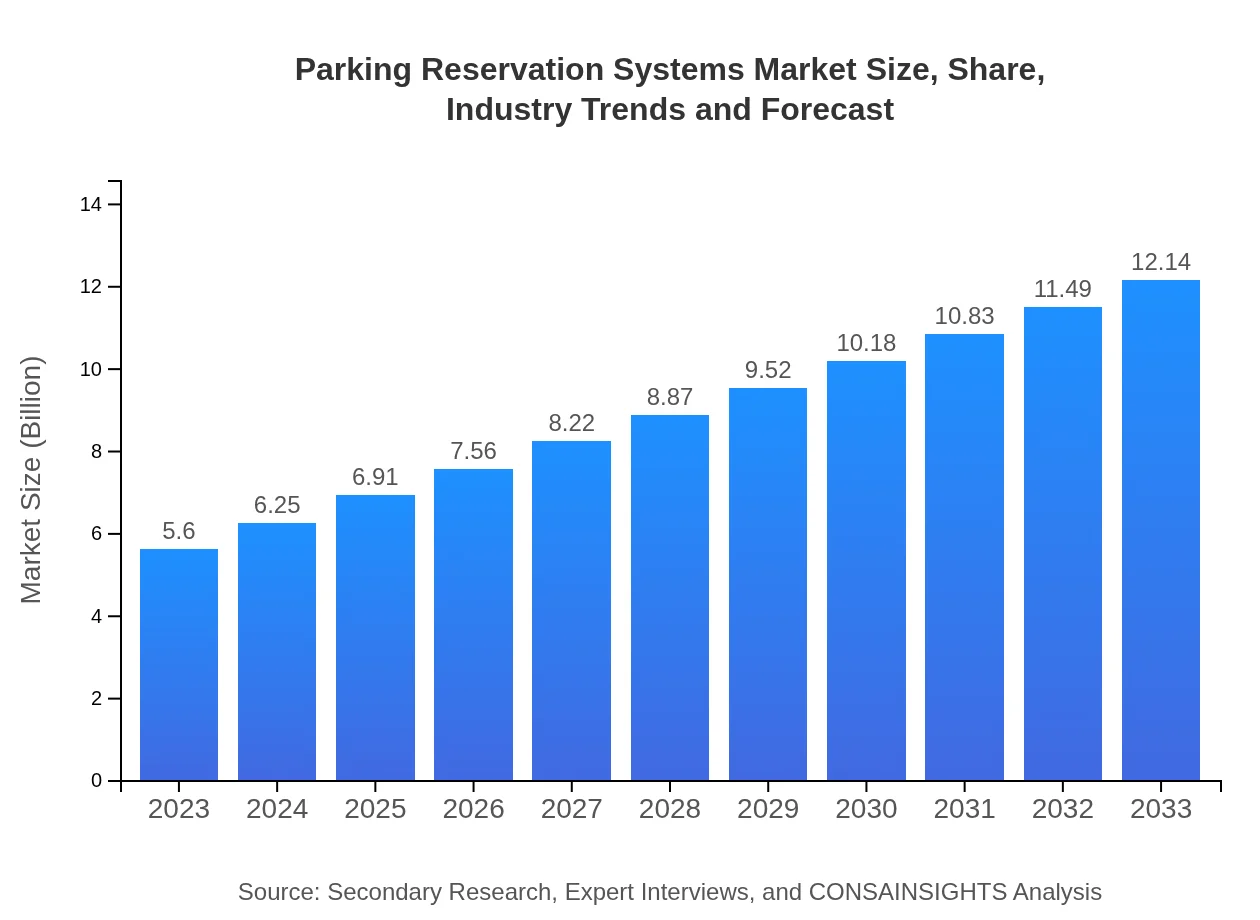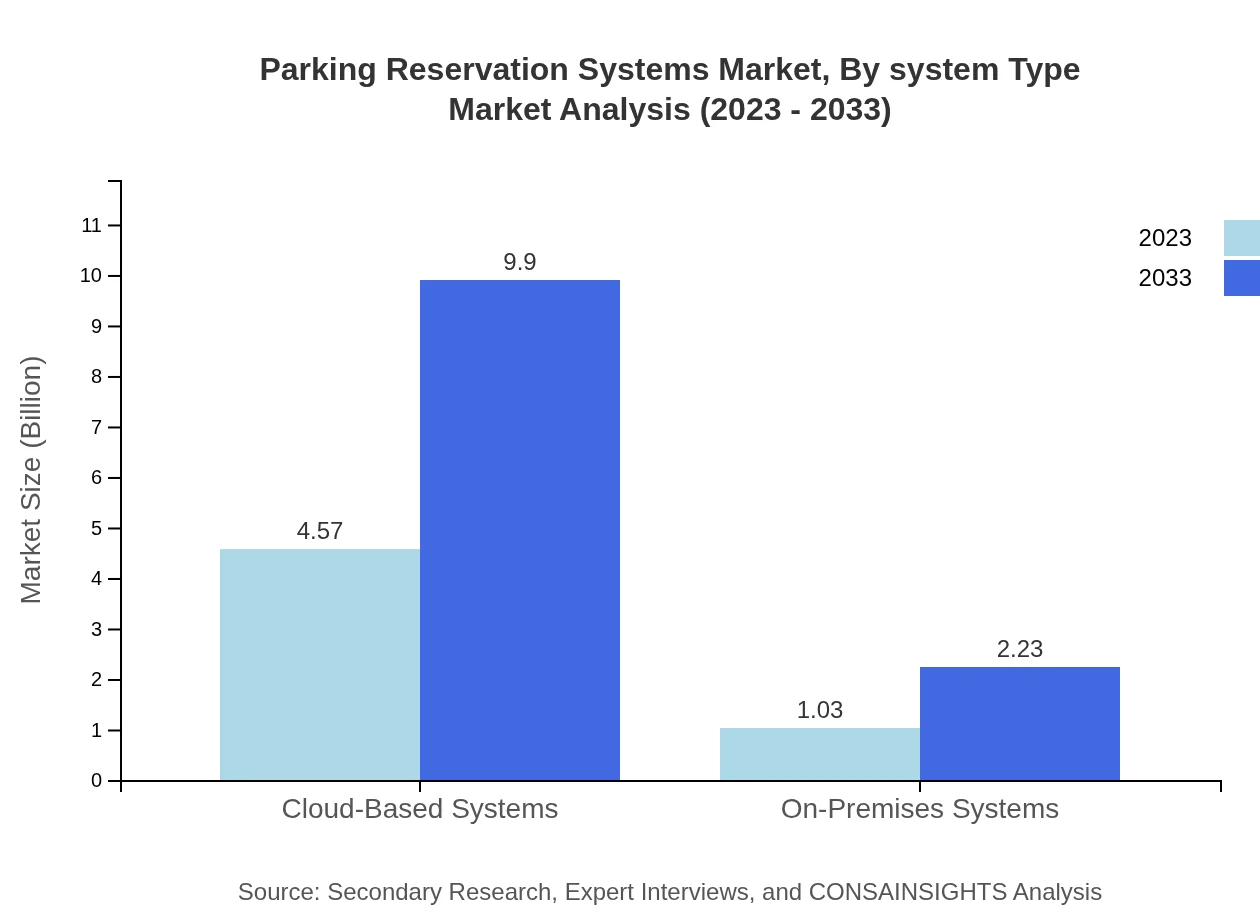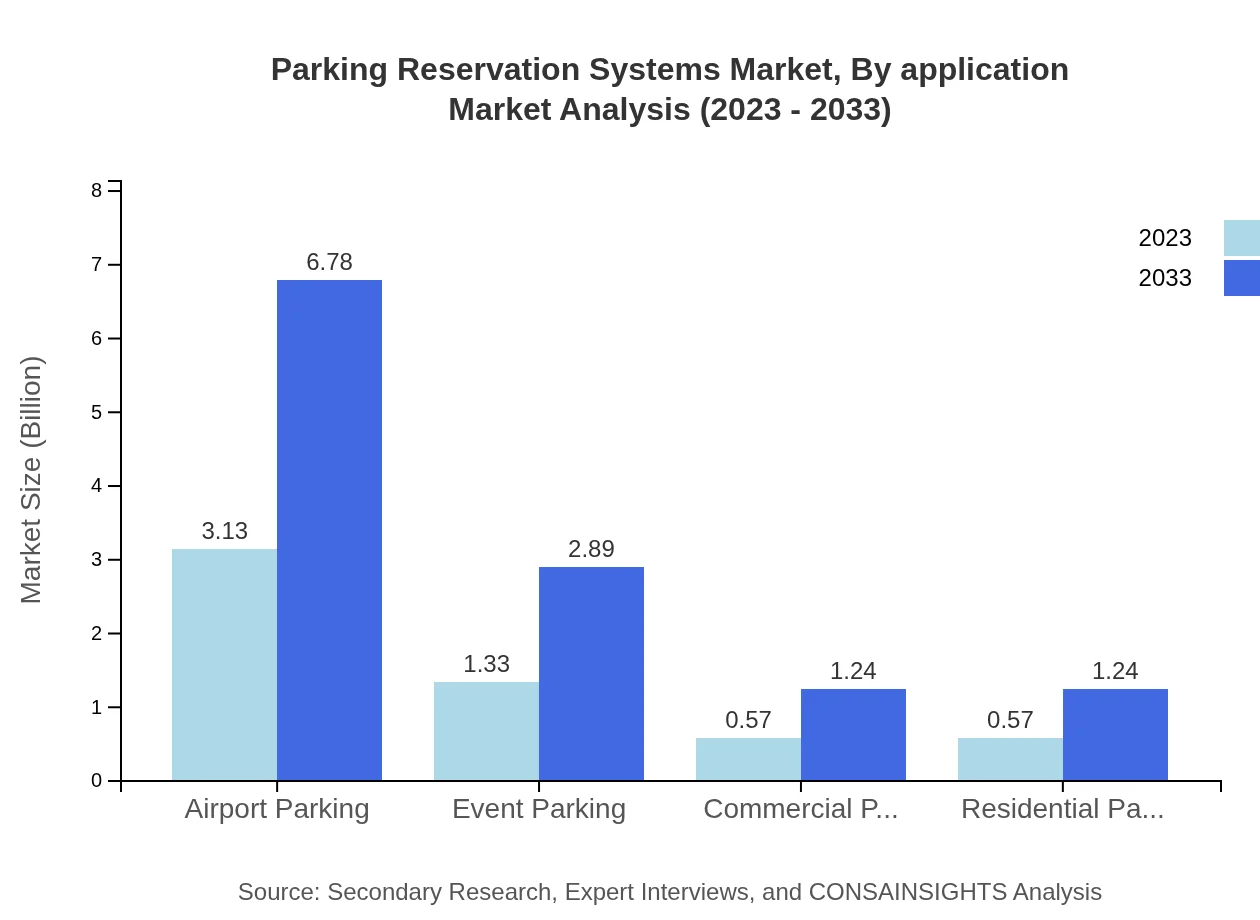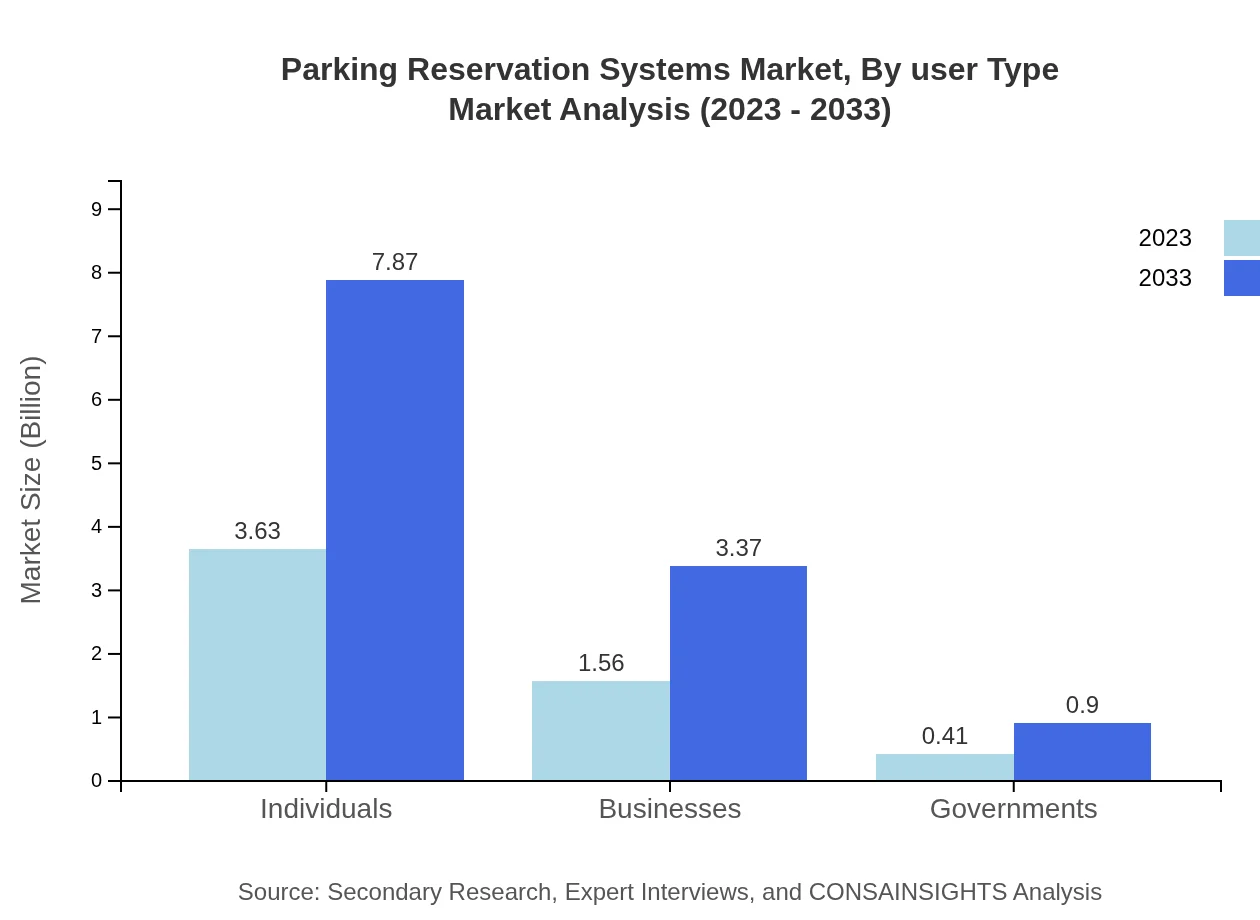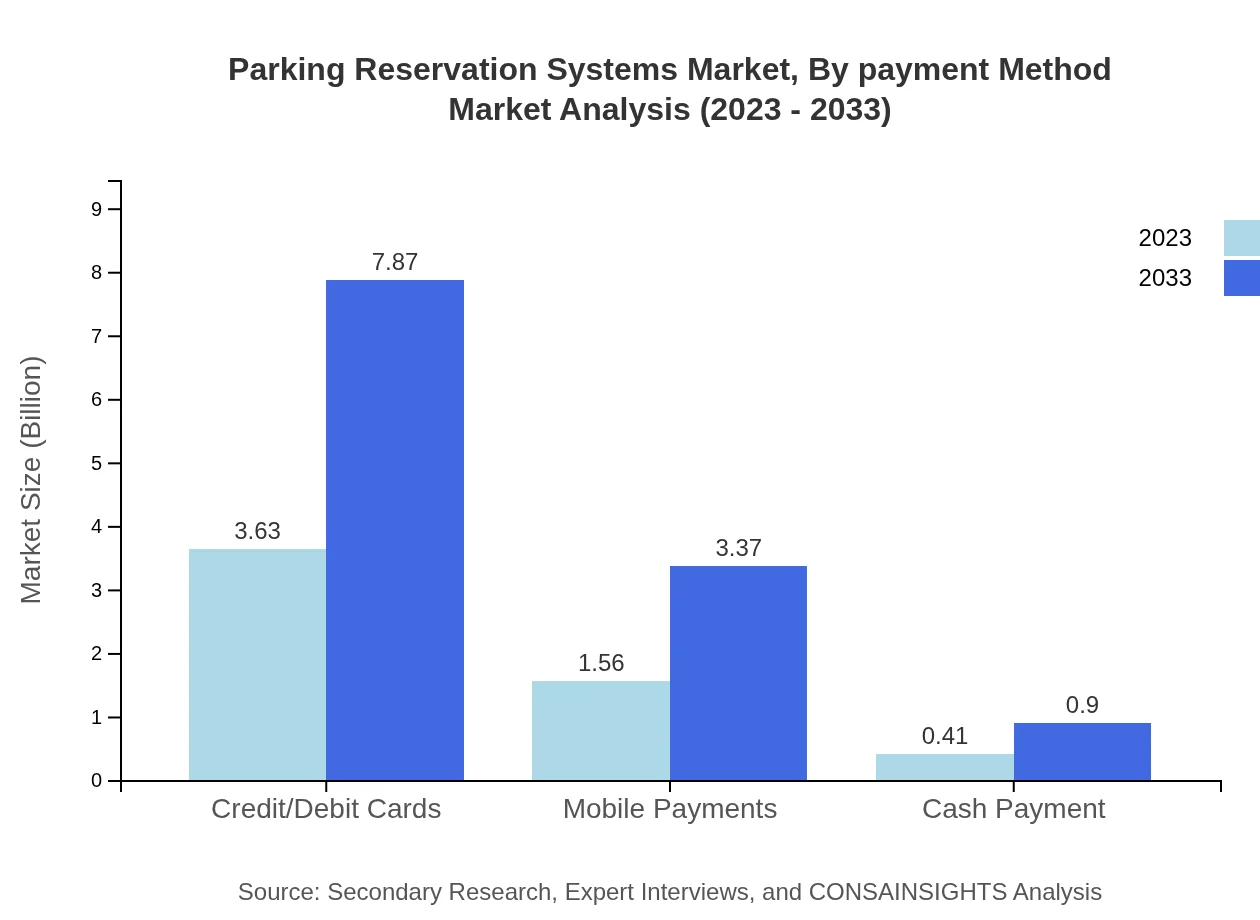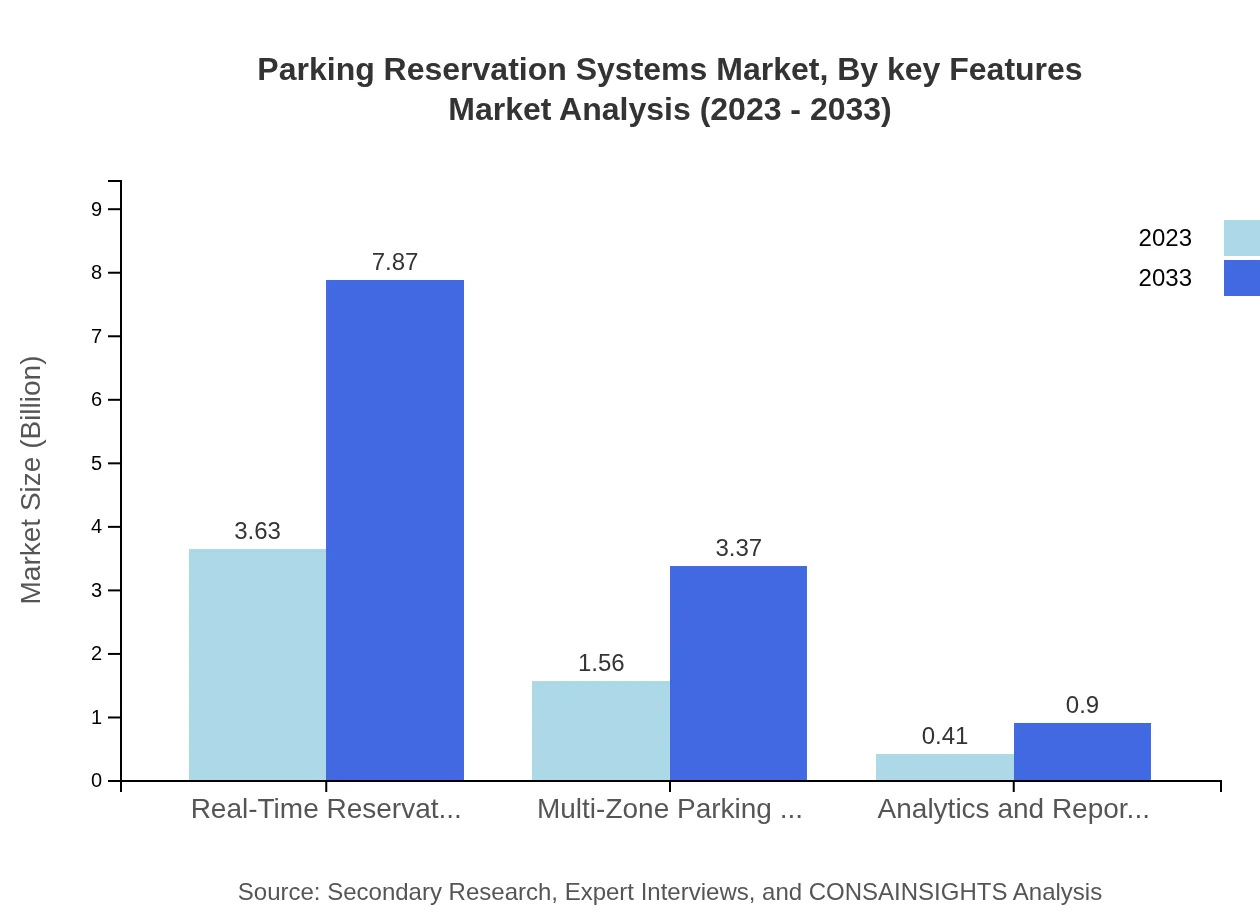Parking Reservation Systems Market Report
Published Date: 31 January 2026 | Report Code: parking-reservation-systems
Parking Reservation Systems Market Size, Share, Industry Trends and Forecast to 2033
This report provides an in-depth analysis of the Parking Reservation Systems market, covering key trends, growth factors, and market forecasts for the years 2023 to 2033. It includes insights on market size, industry leaders, regional breakdowns, and predictions about future developments.
| Metric | Value |
|---|---|
| Study Period | 2023 - 2033 |
| 2023 Market Size | $5.60 Billion |
| CAGR (2023-2033) | 7.8% |
| 2033 Market Size | $12.14 Billion |
| Top Companies | ParkMobile, LLC, SP Plus Corporation, Flowbird, Amano McGann |
| Last Modified Date | 31 January 2026 |
Parking Reservation Systems Market Overview
Customize Parking Reservation Systems Market Report market research report
- ✔ Get in-depth analysis of Parking Reservation Systems market size, growth, and forecasts.
- ✔ Understand Parking Reservation Systems's regional dynamics and industry-specific trends.
- ✔ Identify potential applications, end-user demand, and growth segments in Parking Reservation Systems
What is the Market Size & CAGR of Parking Reservation Systems market in 2023?
Parking Reservation Systems Industry Analysis
Parking Reservation Systems Market Segmentation and Scope
Tell us your focus area and get a customized research report.
Parking Reservation Systems Market Analysis Report by Region
Europe Parking Reservation Systems Market Report:
Europe is projected to increase its market size from USD 1.91 billion in 2023 to USD 4.15 billion in 2033. The growth is attributed to stringent regulations on vehicle emissions and advancements in technology that promote efficient parking.Asia Pacific Parking Reservation Systems Market Report:
The Asia Pacific region is expected to experience significant growth, with the market projected to increase from USD 1.02 billion in 2023 to USD 2.22 billion by 2033. This growth is driven by rapid urbanization, increased vehicle ownership, and government initiatives promoting smart city infrastructure.North America Parking Reservation Systems Market Report:
North America represents a significant share of the market, expected to grow from USD 1.99 billion in 2023 to USD 4.32 billion by 2033. The region's advancement in smart technology adoption and high disposable income contribute to this rapid growth.South America Parking Reservation Systems Market Report:
In South America, the Parking Reservation Systems market is anticipated to grow from USD 0.19 billion in 2023 to USD 0.42 billion by 2033, driven by growing urban populations and a rise in car usage as cities expand.Middle East & Africa Parking Reservation Systems Market Report:
The Middle East and Africa market is forecasted to grow from USD 0.48 billion in 2023 to USD 1.03 billion by 2033. Increased investments in infrastructure development and a growing tourism sector are key drivers in this region.Tell us your focus area and get a customized research report.
Parking Reservation Systems Market Analysis By System Type
The market is segmented into cloud-based and on-premises systems. Cloud-based systems dominate the market with a projected growth from USD 4.57 billion in 2023 to USD 9.90 billion by 2033. This is due to their scalability, lower upfront costs, and ability to integrate with mobile platforms. On-premises systems, though growing, are expected to reach USD 2.23 billion in 2033 from USD 1.03 billion in 2023.
Parking Reservation Systems Market Analysis By Application
The applications include airport parking, event parking, commercial parking, and residential parking. Airport parking leads the market, projected to grow from USD 3.13 billion in 2023 to USD 6.78 billion by 2033. Event parking and commercial parking will also witness strong growth, reflecting increased consumer convenience demands.
Parking Reservation Systems Market Analysis By User Type
The market is divided into individuals, businesses, and governments. Individuals hold the largest share, expected to grow from USD 3.63 billion in 2023 to USD 7.87 billion by 2033. Businesses and governments contribute significantly, with growth from USD 1.56 billion to USD 3.37 billion and USD 0.41 billion to USD 0.90 billion, respectively.
Parking Reservation Systems Market Analysis By Payment Method
The payment methods include credit/debit cards, mobile payments, and cash payments. Credit/debit card payments dominate with growth from USD 3.63 billion in 2023 to USD 7.87 billion by 2033. Mobile payments are also increasing due to technological adoption, growing from USD 1.56 billion to USD 3.37 billion.
Parking Reservation Systems Market Analysis By Key Features
Key features in this market include real-time reservation capabilities, analytics and reporting, and multi-zone parking management. Real-time reservations are projected to capture USD 7.87 billion by 2033 from USD 3.63 billion in 2023, indicating a strong demand for immediate access to parking data.
Parking Reservation Systems Market Trends and Future Forecast
Tell us your focus area and get a customized research report.
Global Market Leaders and Top Companies in Parking Reservation Systems Industry
ParkMobile, LLC:
A leader in mobile parking solutions that provides users with the ability to find, reserve, and pay for parking using a mobile app.SP Plus Corporation:
A prominent player in the parking services industry, offering innovative management solutions across various parking facilities.Flowbird:
Specialized in smart city parking solutions, Flowbird integrates technology for seamless parking experiences.Amano McGann:
An established company that provides advanced parking and revenue control systems, enhancing management capabilities.We're grateful to work with incredible clients.









FAQs
What is the market size of parking reservation systems?
The global market size for parking reservation systems is projected to reach approximately $5.6 billion by 2033, with a compound annual growth rate (CAGR) of 7.8% from 2023 onwards.
What are the key market players or companies in the parking reservation systems industry?
Key players in the parking reservation systems market include major technology firms and startups specializing in smart transportation solutions, notably those harnessing IoT and mobile applications to enhance parking efficiency.
What are the primary factors driving the growth in the parking reservation systems industry?
Growth in this industry is mainly driven by urbanization, an increase in vehicle ownership, advancements in technology, and a growing consumer preference for convenient parking solutions.
Which region is the fastest Growing in the parking reservation systems?
The fastest-growing region in the parking reservation systems market is expected to be Europe, where the market will grow from $1.91 billion in 2023 to $4.15 billion in 2033.
Does ConsaInsights provide customized market report data for the parking reservation systems industry?
Yes, ConsaInsights offers customized market reports tailored to client specifications, ensuring detailed and relevant data analysis for the parking reservation systems industry.
What deliverables can I expect from this parking reservation systems market research project?
Deliverables from the parking reservation systems market research project include comprehensive market analysis, trend insights, competitive landscape assessments, and segmented data breakdowns.
What are the market trends of parking reservation systems?
Current trends in the parking reservation systems market include the shift towards cloud-based solutions, increased mobile payment options, and features like real-time reservation capabilities that enhance user experience.

